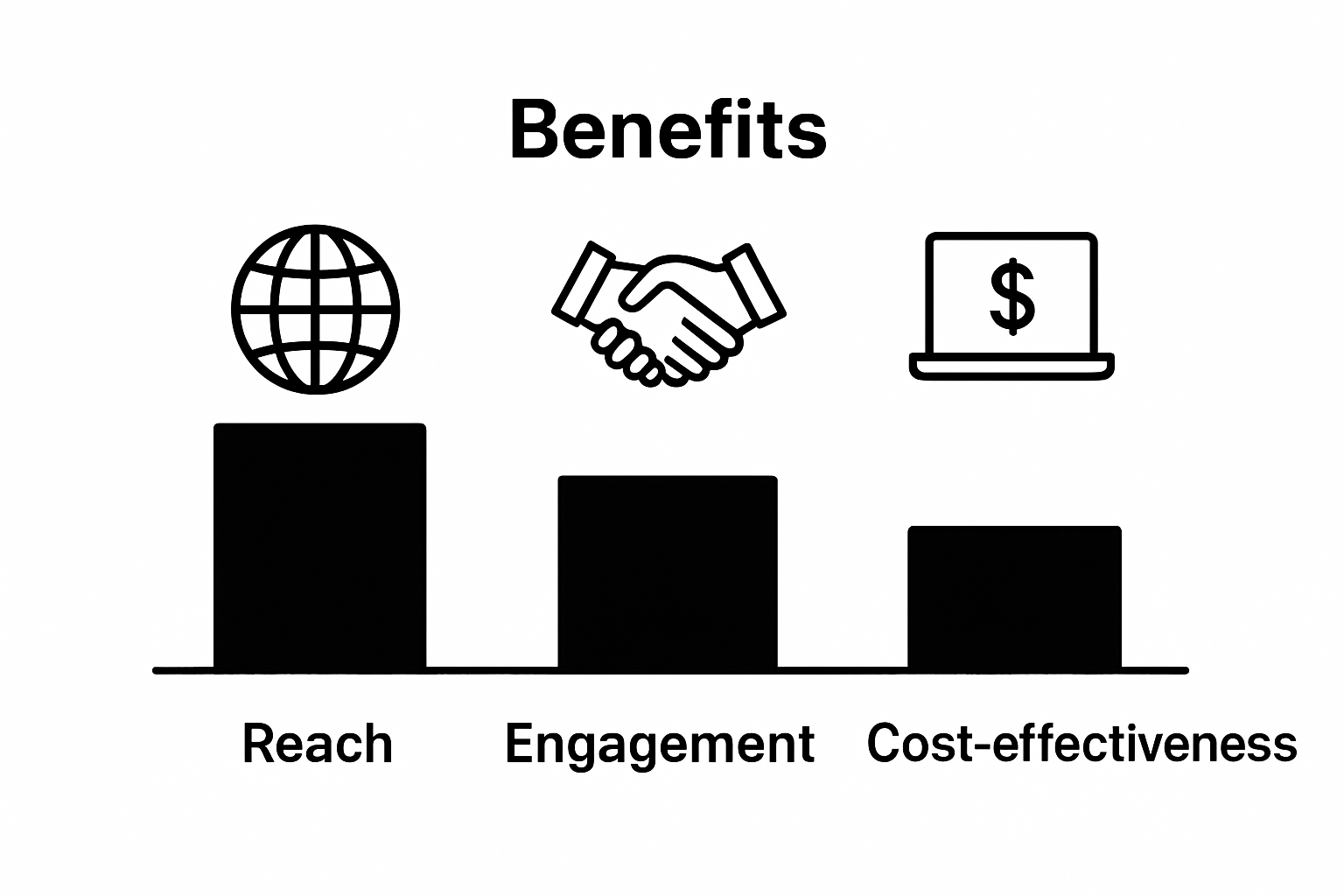Social media platforms now connect more than 4.7 billion people worldwide and have reshaped the way businesses reach and engage their audiences. Yet most companies still treat these channels like digital billboards, missing out on deeper possibilities. The real shift happens when brands use social media not just to talk, but to actually listen and spark real conversations with their communities.
Table of Contents
- Defining Social Media Marketing: Concepts And Terms
- The Importance Of Social Media Marketing In Today's World
- How Social Media Marketing Works: Principles And Strategies
- Key Components Of Effective Social Media Marketing
- Real-World Examples Of Social Media Marketing Success
Quick Summary
| Takeaway | Explanation |
|---|---|
| Engage through authentic storytelling | Craft narratives that resonate emotionally with your target audience to build connections. |
| Adapt content to platform nuances | Tailor your messaging style to fit the unique characteristics of each social media platform. |
| Leverage data for strategic decisions | Use performance metrics and analytics to refine marketing strategies and enhance audience engagement. |
| Foster two-way communication | Encourage audience interaction to create genuine relationships and improve brand loyalty. |
| Prioritize cost-effective marketing | Utilize social media's reach to engage audiences while minimizing traditional advertising costs. |
Defining Social Media Marketing: Concepts and Terms
Social media marketing represents a strategic digital communication approach that leverages online platforms to connect businesses with target audiences, build brand awareness, and drive engagement. This sophisticated marketing discipline goes beyond traditional advertising by creating interactive, personalized experiences that transform how organizations communicate with consumers.
Core Components of Social Media Marketing
At its foundation, social media marketing involves using digital platforms like read more about conversion tracking to develop targeted communication strategies. According to research from ResearchGate, the discipline encompasses several critical elements:
- Content Creation: Developing engaging, relevant material that resonates with specific audience segments
- Audience Interaction: Building meaningful digital relationships through responsive communication
- Performance Analytics: Measuring campaign effectiveness through advanced tracking metrics
Strategic Communication Dynamics
Successful social media marketing requires understanding the nuanced interactions between brands and digital communities. Businesses must craft narratives that transcend simple promotional messages, instead focusing on creating value, fostering trust, and generating meaningful conversations.
The approach demands a deep comprehension of platform-specific communication styles, audience preferences, and evolving digital behavior patterns.
To clarify the essential building blocks of social media marketing, the following table summarizes its key components along with concise explanations.
| Component | Explanation |
|---|---|
| Content Creation | Developing engaging, relevant material tailored to specific audience segments |
| Audience Interaction | Building digital relationships through responsive, two-way communication |
| Performance Analytics | Measuring campaign effectiveness with advanced tracking metrics |
| Audience Mapping | Identifying and understanding demographic and psychographic characteristics of the audience |
| Platform Selection | Choosing the most relevant digital channels based on audience and brand objectives |
Understanding these strategic communication dynamics enables organizations to transform social media from a mere broadcasting channel into a sophisticated engagement platform that drives brand loyalty, customer insights, and potential conversions.
The Importance of Social Media Marketing in Today's World
In the contemporary digital landscape, social media marketing has emerged as a critical strategy for businesses seeking to establish meaningful connections with their target audiences. Beyond traditional marketing approaches, this discipline offers unprecedented opportunities for brand visibility, customer engagement, and strategic communication.
Global Reach and Audience Connectivity
Social media platforms have fundamentally transformed how organizations communicate, providing instant access to global audiences. explore digital advertising strategies that complement these efforts. According to research published in Frontiers in Psychology, social media marketing activities significantly influence customer intentions through several key mechanisms:
- Expanded Market Penetration: Enabling businesses to reach demographics previously inaccessible through traditional channels
- Real-Time Interaction: Facilitating immediate communication and feedback loops
- Cost-Effective Marketing: Reducing promotional expenses while maximizing potential audience engagement

Strategic Business Advantages
The strategic importance of social media marketing extends far beyond simple promotional activities. Modern businesses leverage these platforms to build brand narratives, understand consumer behaviors, and create personalized experiences that foster long-term customer loyalty.
Unlike traditional marketing channels, social media provides granular insights into audience preferences, enabling organizations to refine their communication strategies dynamically. This data-driven approach allows businesses to develop targeted content, predict market trends, and respond rapidly to changing consumer expectations.
Moreover, social media marketing serves as a powerful mechanism for building trust and credibility.
The following table presents the primary advantages of social media marketing for businesses, organizing strategic benefits to enhance understanding of its real-world importance.
| Advantage | Description |
|---|---|
| Global Audience Reach | Enables instant access to diverse demographics previously unreachable by traditional means |
| Real-Time Engagement | Facilitates immediate communication and feedback with audiences |
| Cost-Effective Promotion | Reduces marketing expenses while increasing engagement possibilities |
| Data-Driven Insights | Provides granular information on consumer preferences, enabling strategic refinement |
| Building Trust and Credibility | Fosters loyalty through authentic content and transparent interaction |
How Social Media Marketing Works: Principles and Strategies
Social media marketing operates through a sophisticated ecosystem of strategic planning, content creation, audience engagement, and performance analysis. This comprehensive approach transforms digital platforms into powerful communication channels that enable businesses to connect with audiences in meaningful and measurable ways.
Strategic Content Development
learn about online marketing foundations that underpin effective social media strategies. According to research from the University of Minnesota, successful social media marketing requires a structured approach that encompasses several critical elements:
- Audience Mapping: Identifying and understanding target demographic characteristics
- Content Planning: Developing a strategic editorial calendar aligned with brand objectives
- Platform Selection: Choosing digital channels most relevant to the target audience
Engagement and Interaction Mechanisms.
Effective social media marketing transcends traditional broadcasting models by creating interactive, responsive communication frameworks. Organizations must develop strategies that encourage two-way dialogue, enabling audiences to participate actively in brand narratives.
This approach involves crafting content that resonates with audience interests, leveraging storytelling techniques, and maintaining consistent brand voice across different platforms. Successful marketers understand that engagement is not about volume, but about creating genuine connections that inspire trust, loyalty, and meaningful interactions.
Moreover, social media marketing demands continuous adaptation. By monitoring performance metrics, analyzing audience feedback, and remaining agile in content strategy, businesses can refine their approach, ensuring relevance and maintaining audience interest in an ever-evolving digital landscape.
Key Components of Effective Social Media Marketing
Effective social media marketing requires a holistic approach that integrates strategic planning, creative content, technological understanding, and data-driven insights. Organizations must develop comprehensive frameworks that transform digital platforms into powerful communication and engagement tools.
Content and Communication Strategies
explore essential online marketing techniques that underpin successful social media strategies. According to research published in Social Media + Society, successful social media marketing hinges on several fundamental components:
- Authentic Storytelling: Creating narratives that resonate with audience emotions and experiences
- Consistent Brand Voice: Maintaining a uniform communication style across different platforms
- Strategic Content Diversification: Developing varied content formats to maintain audience engagement
Performance Measurement and Analytics
Comprehensive social media marketing strategies demand rigorous performance tracking and continuous refinement. Organizations must implement sophisticated analytics frameworks that provide granular insights into audience behavior, content performance, and engagement metrics.
This involves utilizing advanced tracking tools, conducting detailed audience segmentation, and developing adaptive strategies that respond dynamically to emerging trends and user preferences. Successful marketers understand that data is not merely a measurement tool but a strategic asset that guides decision-making and content development.
By integrating technological capabilities with creative communication strategies, businesses can transform social media from a promotional channel into a sophisticated platform for building meaningful, long-term audience relationships that drive brand loyalty and business growth.
Real-World Examples of Social Media Marketing Success
Social media marketing success transcends theoretical concepts, demonstrating tangible outcomes when organizations strategically leverage digital platforms to connect with audiences, build brand recognition, and drive meaningful engagement.
Innovative Campaign Strategies
discover effective campaign techniques that inspire digital marketing excellence. According to research documenting global social media campaigns, successful initiatives share several distinctive characteristics:
- Authentic Storytelling: Creating narratives that resonate deeply with target audiences
- Visual Compelling Content: Utilizing high-quality imagery and multimedia
- Strategic Audience Targeting: Precisely identifying and engaging specific demographic segments
Breakthrough Digital Engagement Examples
Organizations like the Mayo Clinic have demonstrated remarkable social media marketing prowess by transforming traditional communication channels. By sharing patient success stories and educational healthcare content across platforms, they successfully humanized medical information and created emotional connections with their audience.
Similarly, nonprofit organizations such as Charity Water revolutionized digital engagement by leveraging compelling visual storytelling. Their strategic approach of sharing high-quality photography and transparent impact narratives enabled them to become the first charity to accumulate one million Twitter followers, showcasing how authentic, purpose-driven content can transcend traditional marketing boundaries.
These examples illustrate that successful social media marketing is not about broadcasting messages, but creating genuine, meaningful interactions that transform digital platforms into powerful storytelling and community-building tools.

Ready to Unlock the Real Power of Your Social Media Marketing?
Too many marketers face a gap between brilliant content and real business results. You learned from this article how crucial accurate data, strategic communication, and dependable conversion tracking are for social media marketing success. Without the right tracking tools, it is nearly impossible to truly understand your audience or measure campaign impact. This can lead to wasted budgets and lost opportunities to build lasting customer loyalty.

Imagine tracking every conversion from your social campaigns, enhancing your results and compliance while never missing another lead. Take control of your data by visiting AdPage now. Our server-side tagging solutions help you capture 100% of your conversions, streamline GDPR consent, and integrate seamlessly with your favourite e-commerce platforms. Do not let tracking challenges hold your brand back another day. Start optimizing your social media strategy with AdPage's trusted toolkit and see the real impact of your efforts today.
Frequently Asked Questions
What is social media marketing?
Social media marketing is a strategic approach that leverages online platforms to connect businesses with their target audiences, build brand awareness, and drive engagement through interactive and personalized experiences.
How does social media marketing benefit businesses?
Social media marketing allows businesses to reach a global audience, engage customers in real-time, and create cost-effective marketing strategies that enhance brand visibility and trust while fostering long-term customer loyalty.
What are the key components of an effective social media marketing strategy?
An effective social media marketing strategy includes core components such as content creation, audience interaction, performance analytics, strategic content development, and consistent brand communication across various platforms.
How can businesses measure the success of their social media marketing efforts?
Businesses can measure social media marketing success by tracking engagement metrics, analyzing audience feedback, and using performance analytics tools to gauge content effectiveness and refine their strategies based on data-driven insights.



.png)
